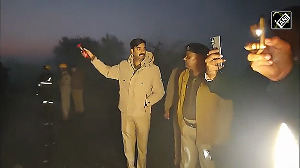Pakistan President Pervez Musharraf on Thursday decided against declaring a state of emergency in Pakistan.
A string of statements from ministers and politicians of the ruling party, speculating about Musharraf's plans to declare emergency, had kept the entire country on tenterhooks since Wednesday night.
Information Minister Mohammed Ali Durrani told mediapersons that emergency was not being imposed and "all speculations and rumours about it are unfounded."
The decision against imposing emergency was taken after Musharraf met legal experts, security officials and leaders from the ruling Pakistan Muslim League.
Durrani said the president wants free, fair and transparent elections.
"In the current situation, the president thinks that there is no requirement of emergency and that is why there is no question of imposing emergency now," he said.
Musharraf also spoke to US Secretary of State Condoleezza Rice on Thursday.
Speculations about emergency were further fuelled when the Pakistan Supreme Court deferred the hearing of Nawaz Sharif's petition to August 16.
In his petition, Sharif pleads that he be allowed to return to Pakistan and participate in the forthcoming general elections.
Musharraf is also facing mounting criticism about the Pakistan government's handling of militants along the Afghan border.
Significantly, Durrani admitted that Musharraf was under pressure from various political quarters to impose emergency.
"There is a provision in the Constitution regarding the imposition of emergency, but the president is of the opinion that the present time is not fit for enforcing it," said Durrani.
Minister of State for Information Tariq Azim told a private television channel on Wednesday night that the government was seriously considering the measure.
Azim also cited "external and internal threats" and the deteriorating law and order situation in the volatile north-west region, near the Afghan border.
Rumblings about emergency rule coincided with Musharraf's last-minute decision to pull out of a key three-day tribal council in Kabul on Wednesday. The council is discussing ways to end Taliban and Al Qaeda sponsored terrorism.
Many political analysts believe that the prospect of a judicial order, allowing Sharif to return to Pakistan, could also have rattled Musharraf.
Exiled former premier Benazir Bhutto said that the imposition of emergency would be a "drastic" step."This will be a negative step for the restoration of democracy," she told Pakistan's Geo TV from New York.
During a state of emergency, the government can restrict the freedom to move, rally, engage in political activities or form groups. The government can also dissolve the parliament or restrict its right to formulate laws.
According to Pakistan's Constitution, the president may declare a state of emergency if it is deemed that the country's security is "threatened by war or external aggression or by internal disturbance beyond the government's authority to control."
Musharraf reportedly considered declaring emergency after holding a combined meeting of the Parliament, consisting of the National Assembly and the Senate. He also contemplated imposing martial law.
A state of emergency also empowers him to extend the tenure of the National Assembly by another year. The term of the present Assembly ends on November 14, 2007.
But the factor that deterred the president from declaring emergency was Article 233-2 of the Constitution, which restricts the functioning of courts under emergency.
While the clause speaks of restrictions on courts to enforce fundamental rights, eminent lawyers like Aitejaz Ahesan said there was sufficient scope for the Supreme Court to decide whether the conditions were justified or not for the imposition of emergency.
"There is absolutely no case to impose emergency. Even if Musahrraf clamps it, the Supreme Court will strike it down. We will ensure that," said Ahesan, who successfully represented reinstated Chief Justice Iftikhar Chaudhry.





